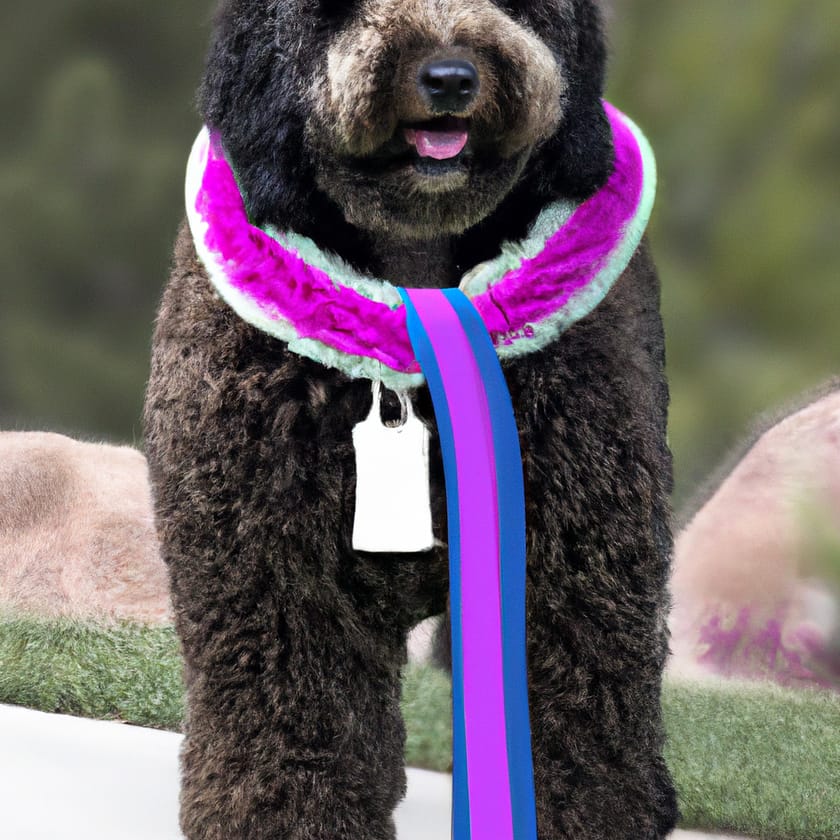Bernedoodle Vs Goldendoodle: What’s The Difference?
Are you torn between choosing a Bernedoodle or a Goldendoodle as your new furry companion? Look no further! In this article, we will explore the key differences between these two popular doodle breeds, helping you make an informed decision about which one is the perfect fit for you and your family. From size and appearance to temperament and exercise needs, we’ll break it down for you, ensuring that you find the ideal four-legged friend to bring into your home. So, let’s dive right in and discover the distinctions between Bernedoodles and Goldendoodles!
Appearance
Coat color and texture
Both Bernedoodles and Goldendoodles come in a variety of coat colors. Bernedoodles typically have a tricolor coat, with a mix of black, white, and brown. Goldendoodles, on the other hand, can vary in color depending on the type of Poodle they are bred with. They can have a solid golden, cream, or apricot coat, or they can have a parti-color coat with patches of white and another color.
In terms of coat texture, Bernedoodles usually have curly or wavy hair that is more similar to the Poodle parent, while Goldendoodles can have a straighter or wavier coat that resembles the Golden Retriever parent. Both breeds have differing coat textures and colors, which adds to their unique appearances.
Size and build
Bernedoodles and Goldendoodles both come in different sizes depending on the breeding. Bernedoodles can range in size from small to large, depending on whether they are bred with a Standard Poodle or a Miniature Poodle. Mini Bernedoodles can weigh between 25-49 pounds, while Standard Bernedoodles can weigh between 70-90 pounds.
Goldendoodles also vary in size. Miniature Goldendoodles weigh between 15-34 pounds, while Standard Goldendoodles weigh between 50-90 pounds. Both breeds have a sturdy and well-built body, but the size can vary greatly depending on the specific breeding.
Temperament
Personality traits
Both Bernedoodles and Goldendoodles are known for their friendly and sociable personalities. They are typically affectionate, gentle, and great with families and children. Bernedoodles are often described as intelligent, loyal, and devoted, while Goldendoodles are known for being friendly, outgoing, and eager to please.
These breeds are usually people-oriented and enjoy being part of the family. They are often good with other pets and can be playful and fun-loving. It’s important to note that individual temperaments can vary, so it’s crucial to spend time with the specific dog you are considering to see if their personality traits align with your own.
Energy levels
Both Bernedoodles and Goldendoodles are typically active dogs that require regular exercise to keep them happy and healthy. However, the energy levels can vary depending on the individual dog and the parent breeds they take after.
Bernedoodles may have slightly higher energy levels due to their Bernese Mountain Dog heritage, while Goldendoodles may have a more moderate energy level due to their Golden Retriever heritage. Regular exercise such as walks, playtime, and mental stimulation activities are important for these breeds to prevent boredom and destructive behaviors.
Trainability
Both Bernedoodles and Goldendoodles are known for being intelligent and trainable dogs. They usually respond well to positive reinforcement training methods and enjoy learning new commands and tricks.
Consistency, patience, and positive reinforcement are key when training these breeds. They are eager to please their owners and can be quick learners, especially when training sessions are fun and engaging. Early socialization and obedience training are essential to help them become well-rounded and obedient adult dogs.

Grooming
Coat maintenance
Both Bernedoodles and Goldendoodles have coats that require regular grooming to keep them looking their best. Bernedoodles have curlier and denser coats, which means they may require more maintenance. Regular brushing is necessary to prevent matting and to keep their coats clean and tangle-free.
Goldendoodles have a variety of coat types, ranging from wavy to curly. These coats also need regular brushing to prevent matting, but the frequency may vary depending on the individual dog. It’s important to establish a grooming routine early on and get your Bernedoodle or Goldendoodle used to being brushed and handled.
Bathing and brushing
Both breeds benefit from regular bathing to keep their coats clean and to remove any dirt or debris. However, over-bathing can strip their coats of natural oils, so it’s important to find a balance. It’s recommended to bathe them every 4-6 weeks or as needed.
In addition to bathing, regular brushing is crucial to prevent matting and to keep their coats in good condition. Brushing should be done at least once a week, but more frequent brushing may be necessary for Bernedoodles, especially those with curlier coats. Professional grooming may also be required every 6-8 weeks to trim their hair and maintain their overall appearance.
Allergies
Hypoallergenic qualities
While neither Bernedoodles nor Goldendoodles are completely hypoallergenic, they can be suitable for some allergy sufferers. Both breeds have Poodle genetics, which means they may have less dander and shed less compared to other dog breeds.
It’s important to note that each individual’s allergies are different, and some people may still have allergic reactions to these breeds. It’s recommended for allergy sufferers to spend time with the specific dog they are considering to see if they experience any allergic symptoms.
Dander and shedding
Both Bernedoodles and Goldendoodles have coats that can range from low to moderate shedding. Bernedoodles with curlier coats tend to shed less than those with wavier coats. Goldendoodles, on the other hand, may have more variation in shedding depending on their coat type.
Regular grooming and brushing can help to reduce shedding and to keep loose hair under control. It’s important to be prepared for some level of shedding with both breeds and to factor in additional cleaning and maintenance to keep your home free from loose hair.

Exercise Needs
Daily physical activity requirements
Both Bernedoodles and Goldendoodles are active breeds that require a good amount of daily physical exercise to keep them happy and healthy. A minimum of 30-60 minutes of exercise per day is usually recommended for these breeds.
This exercise can include activities such as brisk walks, jogging, playing fetch, or participating in dog sports such as agility or obedience training. They enjoy being outdoors and engaging in activities with their owners, so providing them with regular exercise opportunities is essential to prevent boredom and behavioral issues.
Mental stimulation needs
In addition to physical exercise, Bernedoodles and Goldendoodles also require mental stimulation to keep their minds stimulated and to prevent boredom. These breeds are intelligent and enjoy learning and problem-solving.
Providing them with puzzle toys, interactive games, and training sessions can help keep their minds sharp and prevent them from developing destructive behaviors out of boredom. Mental stimulation can also include activities such as scent work or obedience training, which allows them to use their natural instincts and intelligence.
Health Concerns
Common health issues
Bernedoodles and Goldendoodles, like all mixed breeds, can inherit health issues from their parent breeds. However, hybrid vigor can often reduce the risk of some inherited health conditions. It’s important to work with reputable breeders who perform health testing on their parent dogs to minimize the risk of passing on genetic issues.
Some common health concerns in Bernedoodles may include:
- Hip and elbow dysplasia
- Progressive Retinal Atrophy (PRA)
- Von Willebrand’s disease
Some common health concerns in Goldendoodles may include:
- Hip and elbow dysplasia
- Progressive Retinal Atrophy (PRA)
- Hypothyroidism
Life expectancy
The life expectancy of Bernedoodles and Goldendoodles can vary depending on various factors, including their overall health and genetics. On average, Bernedoodles have a lifespan of 10-15 years, while Goldendoodles have a slightly longer lifespan, ranging from 10-15 years.
Maintaining a healthy lifestyle, including regular vet check-ups, proper nutrition, and exercise, can help maximize their life expectancy and ensure they live a happy and fulfilling life.
Compatibility with Children
Interaction with kids
Both Bernedoodles and Goldendoodles are generally great with children and make excellent family pets. They are often friendly, gentle, and patient with kids, making them suitable companions for households with children of all ages.
These breeds tend to form strong bonds with their human family members, including children, and are often protective and nurturing. However, it’s important to supervise younger children and teach them how to properly interact and handle the dog to prevent any accidental injuries.
Tolerance for rough play
Bernedoodles and Goldendoodles are usually tolerant of rough play and can handle the energy and enthusiasm of children. They often have a playful nature and enjoy engaging in activities and games with their human counterparts.
However, it’s still important to teach children to be gentle and respectful towards the dog. Rough play should be avoided to prevent any accidental injuries or stress on the dog. Proper socialization and training can help establish boundaries and teach both the dog and child how to interact safely and appropriately.
Suitability for Allergy Sufferers
Reaction to allergies
Both Bernedoodles and Goldendoodles can be suitable for some allergy sufferers due to their lower shedding and potential hypoallergenic qualities. However, it’s important to note that no dog breed is completely hypoallergenic, and individual allergies can vary.
Some individuals with allergies may still experience allergic reactions to these breeds, even with their low-shedding coats. It’s recommended for allergy sufferers to spend time with the specific dog they are considering and consult with their doctor or allergist before making a decision.
Apartment living considerations
Bernedoodles and Goldendoodles can adapt well to apartment living, but there are a few factors to consider. Both breeds require regular exercise, so access to outdoor spaces or nearby parks is advantageous. Ensuring that they receive their daily physical activity needs is important to prevent boredom and destructive behaviors in a smaller living space.
Additionally, noise level and potential neighbor concerns should be taken into account, as these breeds can be vocal at times. As long as their exercise and mental stimulation needs are met, Bernedoodles and Goldendoodles can thrive in an apartment setting with the right care and attention.
Cost
Initial purchase price
Both Bernedoodles and Goldendoodles can come with a higher initial purchase price compared to some other dog breeds. The cost can vary depending on factors such as the breeder’s reputation, the quality of the parent dogs, and the demand for the specific breed.
On average, Bernedoodles can range in price from $2,000 to $5,000 or more, while Goldendoodles can range from $1,500 to $3,000 or more. It’s important to budget for the initial purchase price and also consider additional costs such as supplies, vet care, and grooming expenses.
Ongoing expenses
In addition to the initial purchase price, it’s important to consider the ongoing expenses of owning a Bernedoodle or Goldendoodle. These expenses can include:
- Veterinary care, including regular check-ups, vaccinations, and potential medical treatments.
- Food and treats, ensuring that their nutritional needs are met.
- Grooming expenses, including regular brushing, bathing, and potential professional grooming.
- Supplies such as toys, bedding, and other accessories.
- Training classes or private sessions, especially for first-time dog owners.
It’s important to factor in these ongoing expenses and be prepared to provide the necessary care and resources to keep your Bernedoodle or Goldendoodle healthy and happy.
Availability
Breeder availability
Both Bernedoodles and Goldendoodles are popular breeds, which means there are many breeders who specialize in breeding and raising these hybrid dogs. It’s important to do thorough research and choose a reputable breeder who prioritizes the health and well-being of their parent dogs and puppies.
Reputable breeders will perform health testing on their parent dogs, provide proper socialization for the puppies, and offer support and guidance to new owners. Take the time to ask questions, visit the breeder’s facility if possible, and ensure that you are comfortable with the breeder’s practices before making a decision.
Rescue adoption options
In addition to purchasing from a breeder, there are also rescue organizations and shelters that may have Bernedoodles or Goldendoodles available for adoption. These dogs may be surrendered or abandoned for various reasons and are in need of loving homes.
Adopting from a rescue organization can be a rewarding experience and provides a second chance to a dog in need. It’s important to inquire about any medical or behavioral history of the dog and to work closely with the rescue organization to ensure a good match for both the dog and your family.
In conclusion, both Bernedoodles and Goldendoodles are popular hybrid breeds that offer a mix of desirable traits from their parent breeds. They have unique appearances, friendly temperaments, and can be suitable for families, including those with children and allergy sufferers. However, it’s important to consider factors such as grooming needs, exercise requirements, and ongoing expenses before bringing one of these adorable and lovable dogs into your home. Whether you choose a Bernedoodle or a Goldendoodle, providing them with love, care, and a happy home will ensure they thrive as beloved family pets for years to come.











